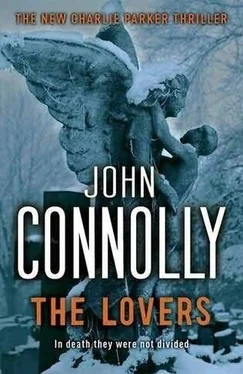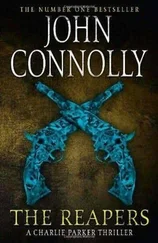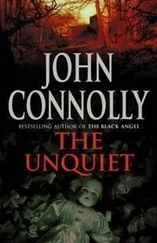John Connolly - The Lovers
Здесь есть возможность читать онлайн «John Connolly - The Lovers» весь текст электронной книги совершенно бесплатно (целиком полную версию без сокращений). В некоторых случаях можно слушать аудио, скачать через торрент в формате fb2 и присутствует краткое содержание. Жанр: Триллер, на английском языке. Описание произведения, (предисловие) а так же отзывы посетителей доступны на портале библиотеки ЛибКат.
- Название:The Lovers
- Автор:
- Жанр:
- Год:неизвестен
- ISBN:нет данных
- Рейтинг книги:4 / 5. Голосов: 1
-
Избранное:Добавить в избранное
- Отзывы:
-
Ваша оценка:
- 80
- 1
- 2
- 3
- 4
- 5
The Lovers: краткое содержание, описание и аннотация
Предлагаем к чтению аннотацию, описание, краткое содержание или предисловие (зависит от того, что написал сам автор книги «The Lovers»). Если вы не нашли необходимую информацию о книге — напишите в комментариях, мы постараемся отыскать её.
The Lovers — читать онлайн бесплатно полную книгу (весь текст) целиком
Ниже представлен текст книги, разбитый по страницам. Система сохранения места последней прочитанной страницы, позволяет с удобством читать онлайн бесплатно книгу «The Lovers», без необходимости каждый раз заново искать на чём Вы остановились. Поставьте закладку, и сможете в любой момент перейти на страницу, на которой закончили чтение.
Интервал:
Закладка:
Nobody had heard from Bobby, or had seen him, since the previous day. When 7 P.M. came and went, they called the police. The chief was skeptical. He was new in town, but familiar with the ways of young people. Nevertheless, he accepted that this was not typical behavior for Bobby Faraday, and that twenty-four hours had now gone by since he left the gas station, for Bobby had not hit any of the local bars after work, and Ron Nevill seemed to be the last person to have seen him. The chief put together a description of the boy at the Faraday house, borrowed a photograph that had been taken the previous summer, and informed local law enforcement and the state police of a possible missing person. None of the other agencies responded with any great urgency, for they were almost as cynical about the behavior of young males as the chief was, and in the case of one going missing, they tended to wait for seventy-two hours before assuming that there might be more to the disappearance than a simple case of booze, hormones, or domestic difficulties.
On the second day, his parents, and their friends, began an informal canvass of the town and its environs, with no result. When it began to grow dark, his mother and father returned home, but they did not sleep that night, just as they had not slept the night before. His mother lay in bed, her face turned toward the window, straining to hear the sound of approaching footsteps, the familiar tread of her only son returning to her at last. She stirred only slightly when she heard her husband rise and put on his robe.
“What is it?” she asked.
“Nothing,” he said. “I’m going to make some tea, sit up for a while.” He paused. “You want some?”
But she knew that he was asking only out of politeness, that he would prefer it if she stayed where she was. He did not want them to sit at the kitchen table in silence, together but apart, the fears of one feeding those of the other. He wanted to be alone. So she let him go, and when the bedroom door closed behind him, she began toRon qhe began cry.
On the third day, the formal search began.
The golden host moved as one, countless shapes bending obediently in unison at the gentle touch of the late-winter breeze, like a congregation at church bowing in accordance with the progress of the service, awaiting the moment of consecration that is to come.
They whispered to themselves, a soft, low susurrus that might have been the crashing of distant waves were such an alien noise not unknown in this landlocked place. The paleness of them was dappled in spots by small flowers of red and orange and blue, a scattering of petals upon an ocean of seed and stem.
The host had been spared the reaping, and had grown tall, too tall, even as the crop decayed. A season’s grain had gone to waste, for the old man upon whose land the host was gathered had died the previous summer, and his relatives were fighting over the sale of the property and how the proceeds would be divided. While they fought, the host had stretched skyward, a sea of dull gold in the depths of winter, speaking in hushed tones of what lay, rush hemmed and undiscovered, nearby.
And yet the host, it seemed, was at peace.
Suddenly, the breeze dropped for an instant and the host stood erect, as though troubled by the change, sensing that all was not as it had been, and then the wind rose again, more tempestuous now, transforming into smaller, dispersed gusts that divided the host with ripples and eddies, their caresses less delicate than what had gone before. Unity was replaced by confusion. Scattered fragments were caught in the sunlight before they fell to the ground. The whispering grew louder, drowning the calling of a solitary bird with rumors of approach.
A black shape appeared upon the horizon, like a great insect hovering over the stalks. It grew in stature, becoming the head, shoulders, and body of a man, passing between the rows of wheat while, ahead of him, a smaller form cleaved invisibly through the stalks, sniffing and yelping as it went, the first intruders upon the host’s territory since the old man had died.
A second figure came into view, heavier than the first. This one seemed to be struggling with the terrain and with the unaccustomed exercise that his participation in the search had forced upon him. In the distance, but farther to the east, the two men could see other searchers. Somehow, they had drifted away from the main pack, although that itself had diminished as the day wore on. Already the light was fading. Soon it would be time to call a halt, and there would be fewer of them to search in the days that followed.
They had begun that morning, immediately after Sunday services. The searchers had congregated at the Catholic church, St. Jude’s, since that had the largest yard and, curiously, the smallest congregation, a contradiction that Peyton Carmichael, the man with the dog, had never quite understood. Perhaps, he figured, they were expecting a mass conversion at some point in the future, which made him wonder if Catholics were just more optimistic than other folks.
The chief of police and his men had divided the township into grids, and the townspeople themselves into groups, and had assigned each group an area to search. Sandwiches, potato chips, and sodas in brown bags had been provided by the various churches, although most people had brought food and water of their own, just in case. In a break with Sunday tradition, none had dressed up in the usual finery. Instead, they woe s qad, theyre loose shirts and old pants, and battered boots or comfortable sneakers. Some carried sticks, others garden rakes to search in the undergrowth. There was an air of subdued expectation, a kind of excitement despite the task before them. They shared rides, and drove out to their assigned areas. As each area was searched, and nothing found, another was suggested either by the cops who were coordinating the efforts on the ground, or by contacting the base of operations that had been set up in the hall behind the church.
It had been unseasonably warm when they began, a curious false thaw that would soon end, and the difficulty of coping with soft ground and melting snow had sapped the strength of many before they took a break for lunch at about one or one thirty. Some of the older people had returned home at that stage, content to have made some effort for the Faradays, but the rest continued with the search. After all, the next day was Monday. There would be work to do, obligations to be met. This day was the only one that they could spare to look for the boy, and the best would have to be made of it. But as the light had grown dim, so too the day had grown colder, and Peyton was grateful that he had not left his Timberland jacket in the car but had chosen to tie it around his waist until it was needed.
He whistled at his dog, a three-year-old spaniel named Molly, and waited, once again, for his companion to catch up. Artie Hoyt: of all the people with whom he had to end up. Relations between the two men had been cool for the last year or more, ever since Artie had caught Peyton eyeing his daughter’s ass at church. It didn’t matter to Artie that he hadn’t seen exactly what he thought he’d seen. Yes, Peyton had been looking at his daughter’s ass, but not out of any feelings of lust or attraction. Not that he was above such base impulses: at times, the pastor’s sermons were so dull that the only thing keeping Peyton awake was the sight of young, lithe female forms draped in their Sunday best. Peyton was long past the age when he might have been troubled by the potential implications for his immortal soul of such carnal thoughts in church. He figured that God had better things to worry about than whether Peyton Carmichael, sixty-four, widower, was paying more attention to objects of female beauty than he was to the old blowhard at the pulpit, a man who, in Peyton’s opinion, possessed less Christian charity than the average alligator. As Peyton’s doctor liked to tell him, live a life of wine, women, and song, all in moderation but always of the proper vintage. Peyton’s wife had died three years earlier, taken by breast cancer, and although there were plenty of women in town of the correct vintage who might have been prepared to offer Peyton some comfort on a winter’s evening, he just wasn’t interested. He had loved his wife. Occasionally he was still lonely, although less often than before, but those feelings of loneliness were specific, not general: he missed his wife, not female company, and he viewed the occasional pleasure that he took in the sight of a young, good-looking woman merely as a sign that he was not entirely dead below the waist. God, having taken his wife from him, could allow him that small indulgence. If God was going to make a big deal of it, then, well, Peyton would have a few words for Him too, when eventually they met.
Читать дальшеИнтервал:
Закладка:
Похожие книги на «The Lovers»
Представляем Вашему вниманию похожие книги на «The Lovers» списком для выбора. Мы отобрали схожую по названию и смыслу литературу в надежде предоставить читателям больше вариантов отыскать новые, интересные, ещё непрочитанные произведения.
Обсуждение, отзывы о книге «The Lovers» и просто собственные мнения читателей. Оставьте ваши комментарии, напишите, что Вы думаете о произведении, его смысле или главных героях. Укажите что конкретно понравилось, а что нет, и почему Вы так считаете.












